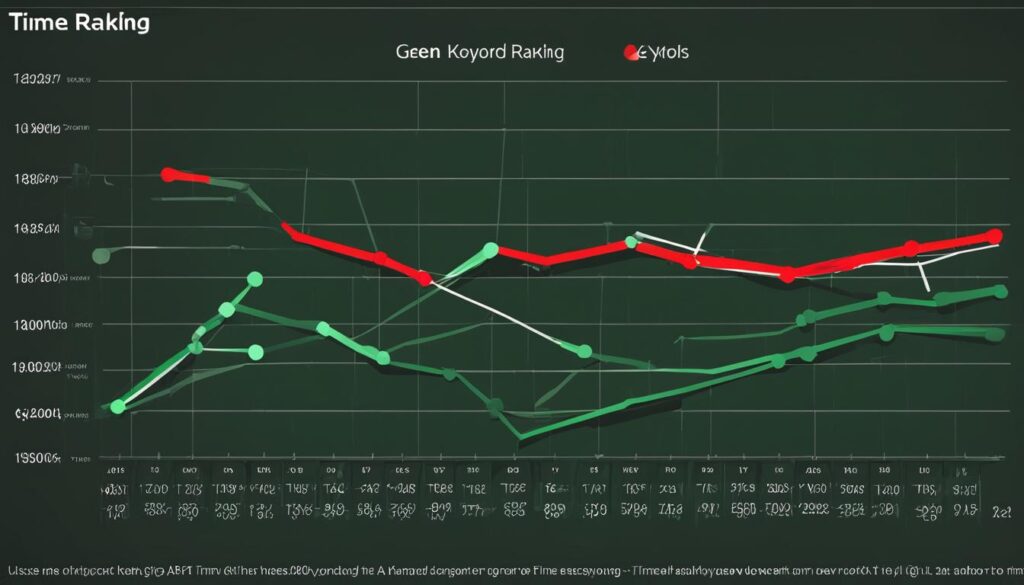Optimizing an e-commerce site for SEO can be a challenging process. However, monitoring and measuring key performance indicators (KPIs) can provide valuable insights to drive more traffic and increase sales. In this section, we will explore 11 essential SEO metrics that are relevant for e-commerce websites, including organic revenue and transactions, assisted organic conversions, conversion rate, and organic user lifetime value.
Key Takeaways:
- Monitoring SEO metrics is crucial for optimizing e-commerce sites and driving traffic and sales.
- Website performance metrics, SEO analytics, and traffic analysis provide valuable insights for improvement.
- Conversion rate optimization and site speed optimization are essential for a seamless user experience.
- Implementing mobile SEO strategies is vital for reaching a wider audience.
- Tracking keyword rankings and conducting backlink analysis helps improve search visibility.
Organic Revenue & Transactions: Tracking SEO Success
When it comes to measuring the success of your e-commerce SEO efforts, tracking organic revenue and transactions is a crucial metric. By understanding how much revenue can be attributed to organic traffic, you can gauge the effectiveness of your SEO strategy and make data-driven optimizations. Apart from revenue, monitoring the number of transactions influenced by organic traffic provides valuable insights into the overall performance of your marketing efforts.
Google Analytics is a powerful tool that can help you track organic revenue and compare it to other marketing strategies. With its intuitive interface and robust reporting capabilities, you can gain detailed insights into how organic traffic contributes to your bottom line.
Let’s not forget that revenue is not the only indicator of success. Tracking organic transactions can shed light on the effectiveness of your marketing strategy. By analyzing this metric, you can understand the number of successful conversions driven by organic traffic and identify potential areas for improvement.
Tracking Organic Revenue and Transactions in Google Analytics
To track organic revenue and transactions in Google Analytics, follow these steps:
- Login to your Google Analytics account.
- Navigate to the “Acquisition” section in the left-hand sidebar.
- Select “All Traffic” and then “Channels.”
- Click on “Organic Search.”
- In the channel report, you’ll find a breakdown of organic revenue and transactions.
By regularly monitoring this data, you can keep a close eye on the impact of your SEO efforts on your e-commerce revenue and transactions. This helps you make informed decisions and prioritize optimization strategies that deliver the best results.
Investing time and effort into measuring organic revenue and transactions is an integral part of a comprehensive e-commerce SEO strategy. By gaining insights into the financial impact of organic traffic, you can continually refine your SEO approach and achieve better results.
Assisted Organic Conversions: Measuring the Impact of SEO
In marketing, it often takes multiple visits to convert a customer. That’s why it’s important to analyze assisted conversions in Google Analytics to gain a better understanding of the impact of your SEO strategy. Assisted conversions refer to the number of conversions that organic traffic has influenced or touched along the customer journey. This metric provides valuable insights into the effectiveness of your SEO efforts in driving conversions.
Google Analytics enables you to track assisted conversions and determine the revenue generated by them. By measuring assisted conversions, you can evaluate the true impact of your SEO strategy beyond just the last-click conversions. This allows you to assess the value of organic traffic in contributing to your overall revenue and understand how it complements other traffic sources.
Assisted conversions represent the conversions that organic traffic assisted but may not directly attribute to. These conversions could be influenced by other marketing channels, such as paid advertising or social media, but were initially introduced to your website through organic search. By tracking assisted conversions, you gain a holistic view of the entire customer journey and the various touchpoints that lead to conversions.
Understanding assisted conversions can help you identify the most effective traffic sources that drive conversions. By analyzing the assisted conversion data, you can optimize your SEO strategy and allocate resources to the channels that provide the most value. Additionally, this metric enables you to refine your keyword targeting and content optimization efforts to attract and engage users who are more likely to convert.
By leveraging Google Analytics to track assisted conversions, you can measure the impact of your SEO strategy in driving real results and revenue. It provides a comprehensive view of how organic traffic contributes to your conversions, allowing you to make data-driven decisions to optimize your website and improve your overall conversion rate.
Key Takeaways:
- Assisted conversions provide insights into how organic traffic influences conversions beyond just the last-click interactions.
- Google Analytics allows you to track and measure the revenue generated by assisted conversions.
- Understanding assisted conversions helps identify effective traffic sources and optimize SEO strategies.
- Analyzing assisted conversions enables better keyword targeting and content optimization.
| SEO Metric | Description |
|---|---|
| Assisted Conversions | The number of conversions that organic traffic has influenced or touched along the customer journey. |
| Revenue Generated | The monetary value attributed to assisted conversions, providing insights into the impact of SEO efforts on revenue. |
| Optimization Opportunities | By analyzing assisted conversions, you can identify areas for improvement in your SEO strategy and allocate resources effectively. |
Conversion Rate: Assessing On-Page SEO Success

The conversion rate is a crucial metric in assessing the success of on-page SEO efforts. It measures the percentage of visitors who complete a desired action, such as making a purchase or filling out a form. A high conversion rate indicates that your on-page SEO strategies, including website design, content optimization, and user experience, are effectively converting organic traffic into valuable actions.
When analyzing the conversion rate, it is important to compare the performance of organic traffic to that of other marketing channels. This comparison helps identify the strengths and weaknesses of your on-page SEO strategies and provides insights into areas for improvement.
By understanding which marketing channels are driving the highest conversion rates, you can allocate your resources more effectively and optimize your marketing efforts accordingly. For example, if organic traffic has a significantly higher conversion rate compared to paid ads or social media, you may want to invest more in organic SEO and organic traffic generation.
Here is a table that compares the conversion rates of different marketing channels:
| Marketing Channel | Conversion Rate |
|---|---|
| Organic Traffic | 10% |
| Email Marketing | 8% |
| Paid Ads | 6% |
| Social Media | 4% |
As seen in the table above, organic traffic has the highest conversion rate among all marketing channels. This indicates that your on-page SEO strategies are effectively attracting and engaging visitors, leading to a higher likelihood of conversion.
By regularly tracking the conversion rate and making data-driven optimizations, you can continuously improve your on-page SEO efforts and drive higher conversions. Remember that optimizing the conversion rate is a continuous process, and even small improvements can have a significant impact on your e-commerce success.
Implementing effective on-page SEO strategies can significantly boost your conversion rate and drive organic traffic that is more likely to convert. By analyzing the performance of different marketing channels and continually refining your on-page SEO tactics, you can optimize your e-commerce site for success.
Organic User Lifetime Value: Driving Valuable Traffic

When it comes to e-commerce SEO, the ultimate goal is to drive valuable traffic to your website. This means attracting users who have a higher potential for conversions and long-term engagement. One essential metric for evaluating your SEO efforts is the organic user lifetime value.
With Google Analytics, you can track the lifetime value of organic users over time. This metric provides insights into how valuable organic traffic is to your business. By understanding the impact of ranking for relevant keywords and optimizing the on-site user experience, you can make data-driven decisions to enhance your SEO strategy.
Comparing the lifetime value of organic traffic to other channels is critical in determining the value and effectiveness of your organic search efforts. This analysis allows you to allocate resources appropriately and prioritize your SEO initiatives. Understanding which channels bring in the most valuable users helps you optimize your traffic channels and marketing campaigns.
Additionally, focusing on relevant keywords and optimizing your on-site user experience can further enhance the lifetime value of organic users. By targeting keywords that are truly relevant to your products or industry, you attract users who are more likely to convert and remain engaged. Moreover, providing a seamless and enjoyable on-site experience increases the chances of repeat purchases and customer loyalty.
Optimizing for organic user lifetime value is key to driving valuable traffic and maximizing the return on your SEO efforts. By measuring and tracking this metric, you can refine your keyword targeting, improve on-site user experience, and ultimately boost conversions and sales.
>Number of Non-Branded (But Still Relevant) Keywords: Tracking Keyword Performance
 >
>
>Tracking the number of non-branded keywords that your e-commerce site ranks for is crucial for understanding the performance of your SEO strategy. By using keyword tracking tools or Google Analytics’ Search Console integration, you can filter out branded keywords and focus on keywords related to your products or industry. This metric helps identify opportunities to rank for relevant keywords and improve visibility.>
>To effectively track non-branded keywords, consider using Google Analytics. With its comprehensive features, you can gain valuable insights into keyword performance and relevance. By analyzing the number of non-branded keywords that drive organic traffic to your e-commerce site, you can identify the effectiveness of your SEO efforts in attracting new potential customers and expanding your reach.>
>Non-branded keywords indicate that users are searching for products or services related to your industry, rather than specific brands. By monitoring the number and performance of non-branded keywords, you can determine the relevance of your website content and optimize it to align with user search intent. This proactive approach allows you to stay ahead of the competition and position your e-commerce site as a valuable resource in your industry.>
>
>
>Metric> >Definition> >Importance>
>
>
>Non-branded Keywords> >The number of keywords that do not include specific brand names but are still relevant to the products or industry.> >Indicates the effectiveness of SEO in attracting new customers and expanding reach.>
>
>
>Keyword Tracking Tools> >Software or platforms that allow tracking and monitoring of keyword rankings and performance.> >Facilitates data-driven decision-making for SEO strategy optimization.>
>
>
>Google Analytics> >A web analytics tool that provides detailed insights into website traffic, user behavior, and keyword performance.> >Helps measure the effectiveness of SEO efforts and identify areas for improvement.>
>
>
>By regularly tracking the number of non-branded keywords and monitoring their performance, you can evaluate the progress of your SEO strategy and make data-driven optimizations. Remember to analyze keyword relevance, search volume, and competitiveness to identify opportunities for growth and enhance your website’s visibility in search engine results pages. With continuous keyword tracking and optimization, you can drive targeted organic traffic, attract potential customers, and ultimately boost your e-commerce sales.>
Keyword Ranking Increases/Decreases: Monitoring SEO Progress

Tracking the keyword rankings of your website is a crucial aspect of monitoring the success and progress of your SEO campaign. By benchmarking your rankings before implementing any optimization strategies and comparing them to the final results, you can gain insights into how your SEO efforts have impacted your website’s visibility in search engine results pages.
Monitoring both keyword ranking increases and decreases is important as it allows you to identify areas of improvement and adjust your strategies accordingly. When you see an increase in keyword rankings, it indicates that your optimization efforts are paying off, and your website is gaining more visibility for targeted keywords. On the other hand, a decrease in keyword rankings might signify a need for adjustments in your SEO campaign to regain lost visibility.
Regularly checking the performance of your keyword rankings enables you to evaluate the effectiveness of your SEO campaigns and make data-driven decisions for further optimization. Through benchmark analysis, you can recognize which strategies are working well and which areas require more attention, ensuring that your SEO efforts align with your desired goals.
Maintaining Keyword Ranking Advantages
Consistently monitoring keyword rankings allows you to identify effective strategies and maintain the advantageous positions of your targeted keywords. By tracking keyword ranking increases, you can observe the impact of your optimization strategies and replicate them for other keywords or pages on your website. This creates a positive feedback loop for your SEO campaigns and helps improve overall website visibility.
However, keyword ranking decreases should not be disregarded. When you notice a drop in keyword rankings, it is an opportunity to analyze what went wrong and make the necessary adjustments to regain lost positions. It could be an indication of algorithm updates, competitor activities, or potential issues with your website’s content or technical aspects that require attention. By addressing these issues promptly, you can prevent further decreases and maintain a strong SEO presence.
Tracking keyword rankings provides valuable insights into the success of your SEO efforts. It allows you to identify opportunities for improvement, replicate effective strategies, and address any setbacks. By consistently monitoring your keyword rankings, you can ensure that your SEO campaign is on the right track towards achieving your goals.
Below is an example of a table showcasing keyword ranking changes before and after implementing SEO strategies:
| Keyword | Previous Ranking | Current Ranking | Change |
|---|---|---|---|
| Product X | 12 | 3 | +9 |
| Service Y | 7 | 10 | -3 |
| Keyword Z | 20 | 15 | +5 |
By analyzing this table, you can see that the optimization efforts had a significant positive impact on the ranking of “Product X” with a notable increase of 9 positions. However, there was a slight decrease in the ranking of “Service Y” by 3 positions, suggesting the need for further optimization in that area. The keyword “Keyword Z” also experienced an improvement in ranking by 5 positions.
Regularly monitoring keyword rankings and analyzing the changes will help you make informed decisions and continuously refine your SEO strategies to achieve better search engine visibility.
Elevate Your E-Commerce SEO Strategy with Key Metrics
As e-commerce managers, we all strive to optimize our websites for better performance and increased sales. To achieve this, it is crucial to measure and monitor key SEO metrics that directly impact our success. By focusing on important KPIs such as organic revenue, assisted conversions, conversion rate, and keyword rankings, we can evaluate the effectiveness of our SEO efforts and make data-driven optimizations.
Tracking SEO metrics allows us to understand which strategies are working and which areas need improvement. For example, monitoring organic revenue helps us assess the overall success of our SEO campaigns. By comparing revenue generated from organic traffic to other marketing channels, we can determine the impact of our SEO efforts on our bottom line.
Another important metric to consider is assisted conversions. This metric shows the revenue generated by all conversions that organic traffic has influenced, giving us valuable insights into the effectiveness of our SEO strategies. By understanding how many conversions organic traffic has touched, we can truly measure the impact of our SEO efforts and make informed decisions going forward.
While tracking metrics is essential, it can be overwhelming to manage all these data points on our own. This is where partnering with a digital marketing agency can be invaluable. With their expertise and experience, they can help streamline our SEO strategy and ensure that we are focusing on the right metrics. They can guide us in analyzing the data, identifying strengths and weaknesses, and making data-driven optimizations that will drive even greater success for our e-commerce business.









